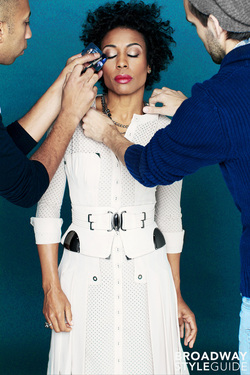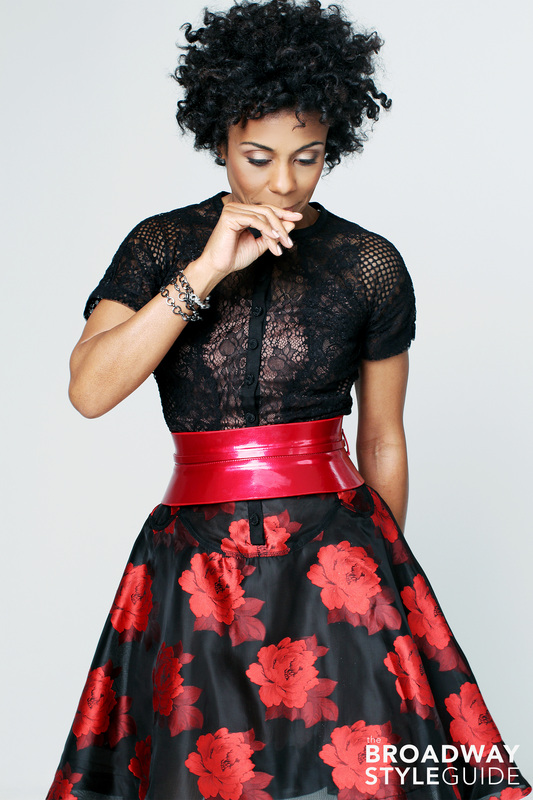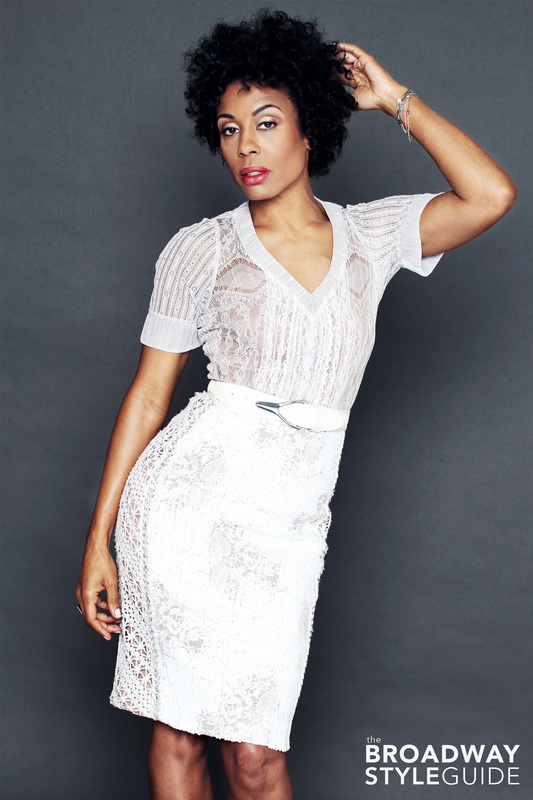|
April's client & friend, Karen Pittman is burning up the Broadway stage and primetime network TV at the same time. But there was a time when money was tight, she had two kids and only a dream. Here's the beginnings of how Karen reached for the light and caught it...  Photograpy by Jeremy Pope Photograpy by Jeremy Pope When Jory steps on stage, she’s in a black Gucci sleeveless sheath dress with a deep v-neck. She’s wrapped in a Burberry coat and decorated in trinkets from Bergdorf Goodman, but what really seems to catch the eye is her red patent leather Manolo Blahniks. “I’ve gotten more comments on my shoes, some nights, than my acting,” jokes Karen Pittman, who currently fills Jory’s shoes in the Broadway production of Disgraced. She even claims that her shoes have their own hashtag on Twitter. “It’s kind of intense.” The play, which was written by Ayad Akhtar and won the Pulitzer Prize for Drama in 2013, follows Amir Kapoor, a Pakistani-American lawyer who has cast aside his Muslim heritage in an effort to better assimilate into his New York life. He becomes connected to a controversial case involving an imam accused of raising money for a terrorist group and suffers the consequences. In Pittman’s words, “the story is about a Muslim who literally consumes the American dream whole. He comes out on the other side and realizes that it’s not what he thought it was, he is not what he thought he was.” Pittman plays the character of Jory, a colleague of Amir’s and an up-and-comer at the same law firm. In fact, both are in the running to become partner. Amir and his wife Emily, an artist who is heavily influenced by Islamic themes, have invited Jory and her husband Isaac, a Jewish museum curator interested in Emily’s art, to a dinner party at their high-end apartment. The pre-meal pleasantries quickly evolve into a tense verbal jousting match covering race, religion and prejudice. Offstage, Pittman prefers boots to high heels. She chooses clunky, colorful comfort over “high fashion,” and dismisses the idea that clothing should be a reflection of class or limited to expensive labels. “Some of the most stylish girls I know are walking around my neighborhood and don’t have a dime. They are working that Forever 21.” Pittman herself loves small Brooklyn boutiques, such as Bird and French Garment Cleaners. But one of her ultimate favorite designers is Duro Olowu. “The colors that he uses are fantastic. The fabrics!” she exclaims. Her eyes brighten with the thought of bold, vibrant prints, and the conversation becomes increasingly animated as she describes the lawyer-turned-fashion-designers’ work. Sadly, Olowu’s flagship is located in London and isn’t as accessible to Pittman. “Duro Olowu! I can’t get him here!” she cries out in deep frustration. As for style icons, Pittman cites old-school African-American Broadway actresses such as Ruby Dee, Diahann Carroll, and Lena Horne. “I’m inspired by women who are capable of creating a sexy, classy style that reflects a great deal of confidence, but also a great sense of themselves,” she says. It’s that solid sense of self-identity that Pittman values. “There’s a good deal of inspiration in knowing who I am and making sure that that comes across before anything else,” she says. And right now, she takes great pride in being a mother. “I definitely consider myself to be like a Brooklyn brown girl, mama style. You hear?” Pittman’s first priority is her kids and she takes the time to walk them to school every morning. Both her children attend Waldorf schools, which emphasizes hands-on learning and creative play during early child development. “Mostly, it’s focused on arts and developing the child before you develop the scholar,” she explains. Last year, Pittman’s ten-year-old son and his classmates built a boat and sailed it on the Hudson river. Her five-year-old daughter loves to cook, and on days off, Pittman likes to take her to the farmer’s market to buy ingredients to “experiment” with. It was Pittman’s desire to be a good role model for her children that led her to acting. “If I’m going to be a mother, I thought, I really want to be a purposeful mother,” she says. “I want to make sure that my son sees me in meaningful pursuits of a career and a life.” When she became pregnant with her son in the early 2000’s, she had a successful career in venture capital but ultimately felt like something was missing. “It was about money and finance,” she says describing her old world. “I had a well-moneyed fantastic life, a Fifth Avenue apartment. I drove a BMW. I was married, but I was miserable. My life was full of material success, but I was not living a meaningful, purposeful life.” Originally, Pittman had moved to the Big City with hopes of becoming a recording artist. She graduated from Northwestern University with a Bachelor’s degree in music, focusing on voice and opera. Shortly after arriving, she got a job at Sony Music working as a temp. Here, she had the opportunity to meet other artists and eventually collaborate with them. It seemed like everything was falling into place, but the feeling didn’t last. Summarizing the experience, Pittman says, “I came to New York City to be a recording artist, ended up working with other artists, and became disillusioned by the music industry. That’s the short version of it.” When Pittman was offered a job at the healthcare investment firm, Psilos, she took it. Even though she had shifted careers, Pittman never lost her love of performing. She continued to take lessons with an acting coach, a practice she began early in her music career. “Singing is a kind of acting,” she muses. It was her coach who recommended she apply to New York University’s acting program, her first step in the journey of figuring out what she really wanted. “Going from Northwestern and getting to NYU was one phase of starting to navigate this conversation for myself,” she says. The next few years were anything but easy. She made it through grad school while caring for her young son. She suffered the loss of her father with whom she was very close. It was also then that she became pregnant with her daughter. “Right about this time, I had a real moment when I thought ‘I’m not going to act anymore. I’m going to go back to working in venture capital,’” Pittman admits. But after an intense conversation with her sister, she decided to go all in. “Raquel called me and said, ‘Look, you gotta shit or get off the pot here babe. Are you going to be an actor or not?’” Then, Pittman auditioned for Disgraced. After reading the script, she was convinced that this was a role she needed to play. “I decided that this was a woman that I desperately wanted to be. This was a human being that I desperately wanted to encounter, to inhabit, to pull off the page and make come to life because, at that point in my life, I didn’t see myself as her.” Nowadays, Pittman’s work seems to follow a unifying theme. “I am interested in creating human beings that have a real sense of the idea that we are all really the same, that we are all really dealing with the same shit. It doesn’t matter what we are or what we look like,” she says. Currently, she has a recurring role on the FX drama The Americans where she plays a recovering alcoholic who befriends Elizabeth Jennings (played by Keri Russell) in an attempt to “push herself forward.” Pittman mentions she’s a large presence in the third season but can’t really reveal much beyond that. Reprising her role as Jory in the Broadway production of Disgraced, Pittman has had a chance to really reflect on what the character has meant to her. “She was a gift, I think, in many ways,” she says sincerely. Pittman truly believes that working on Disgraced has been transformative for her. “That was really a start of a shift in my work. It became more about serving the playwright and serving the play, serving the aesthetic of the storytelling, serving my own personal aesthetic and style as an artist.” It’s because of that, Jory has a special place in her heart. Jory is not a woman typically portrayed in media, especially in a Broadway production. Part of what appealed to Pittman about the character was the fact that Jory was a supporting role in someone else’s journey. “She is not the center of the story around race and identity. She is a witness to someone else’s journey in the 21st century,” she says. To Pittman, Jory is an upwardly mobile, very successful, wealthy African-American who is at the top of her field and making it. She lives in a very moneyed world and as a powerful attorney, she wears, in Pittman’s words, the required uniform. “Amir has his $600 charvet shirts, and Jory has her power shoes.” Those red Manolo Blahniks signify Jory’s success. “She’s been crowned as someone who is important in the law firm,” explains Pittman. “She’s not walking around with a crown on her head, but she brought her own with her ruby slippers on.” Disgraced ends it at the Lyceum theatre on March 1st. The Americans airs on FX Wednesday nights at 10 p.m. written by Madeleine Villavicencio Styled by David Withrow. Hair and Makeup by Geo Brian Hennings.
4 Comments
|
AprilYvetteThompsonis a Tony-winning producer/writer/actor & CEO of TheDreamUnLocked: Boutique Coaching for Actors, Writers & Dreamers Categories
All
|

